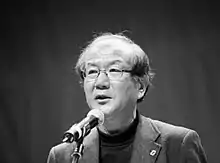Hong Sehwa | |
|---|---|
 Hong Sehwa | |
| Born | 10 December 1947 |
| Nationality | South Korean |
| Alma mater | Seoul University (1966–1967, 1969–1977) |
| Organization | Preparatory Committee for Collective Action for Basic Income (2014–) |
| Notable work | Korean Le Monde diplomatique (2010–) Outsider (2000–2005) |
| Title |
|
| Predecessor | Cho Seung-soo |
| Successor | Kim Il-ung |
| Political party | Labor Party (2013–) New Progressive Party (2008–2013) Democratic Labor Party (2002–2008) |
| Awards | Democratic Citizen Media Award (2002)[1] |
| Hangul | 홍세화 |
| Hanja | 洪世和 |
| Revised Romanization | Hong Sehwa |
| McCune–Reischauer | Hong Sehwa |
| Website | www |
Hong Sehwa (Korean: 홍세화; Hanja: 洪世和; born December 10, 1947) is a South Korean journalist and former New Progressive Party delegate. He is known as a representative South Korean socialist. Hong criticizes imperialism and nationalism, according to the socialist perspective.
Political views
Hong evaluates that both extreme right-wing anti-North Korean statist "conservatives" and anti-Japanese nationalist "liberals" are [anti-socialist] conservatives, and that true progressives or leftists have never had a government in South Korean politics.[2]
Hong Sehwa is critical of South Korean liberals' anti-Japanese nationalism. He sees liberals using radical rhetoric that appears to be anti-imperialist on the outside, ironically curbing the growth of the South Korean socialist movement. He thinks neither Japanese conservative-nationalists nor South Korean liberal-nationalists speak for the working class.[3]
He takes the view that the term "Japanese imperialism" is somewhat exaggerated by liberals, and liberals compromise with chaebol for anti-Japanese nationalistic reasons. He also takes a critical view of the fact that South Korean [mainly DPK] liberals never criticize American imperialism. South Korean socialists criticize American imperialism, that Japanese nationalism is encouraged by the United States to keep China in check.[lower-alpha 1][3]
See also
Notes
- ↑ By 21st century standards, South Korean [non-Juche] socialists do support anti-imperialism, but not support "resistance [anti-Japanese] Korean nationalism". Therefore, The South Korean socialists view that Japanese imperialism has been extinguished since 1945, and they believe that right-wing Japanese nationalistic move to revise Article 9 of the Japanese Constitution and strengthen its military power in the 21st century is not [Japanese] imperialism, but part of the American imperialist project to check China. In contrast, South Korean liberals who support Korean nationalism, they accuse post-1945 Japan of "Japanese imperialism" as well. However, South Korean [mainly DPK] liberals do not criticize American imperialism because they believe that the United States freed the Korea from Japanese colonial rule and protected the South Korea from communist aggression.[3]
References
- ↑ Citizens' Coalition for Democratic Media (2002-12-20). 제 4회 민주시민언론상 수상자 발표 및 시상 안내 [The announcement and schedule of the winner of the 4th Democratic Citizen Media Award] (in Korean). Archived from the original on 2014-03-22. Retrieved 2014-03-22.
- ↑ "홍세화 "민주화 외친 586, 돈벌이 어려움 모르는 민주건달"". 매일경제. 19 December 2020. Retrieved 30 April 2023.
- 1 2 3 "[홍세화 칼럼] 관제 민족주의의 함정". 8 August 2019.
External links
- Hong Sehwa's website (in Korean)
- Hong Sehwa on Facebook (in Korean)
- Hong Sehwa on Twitter (in Korean)